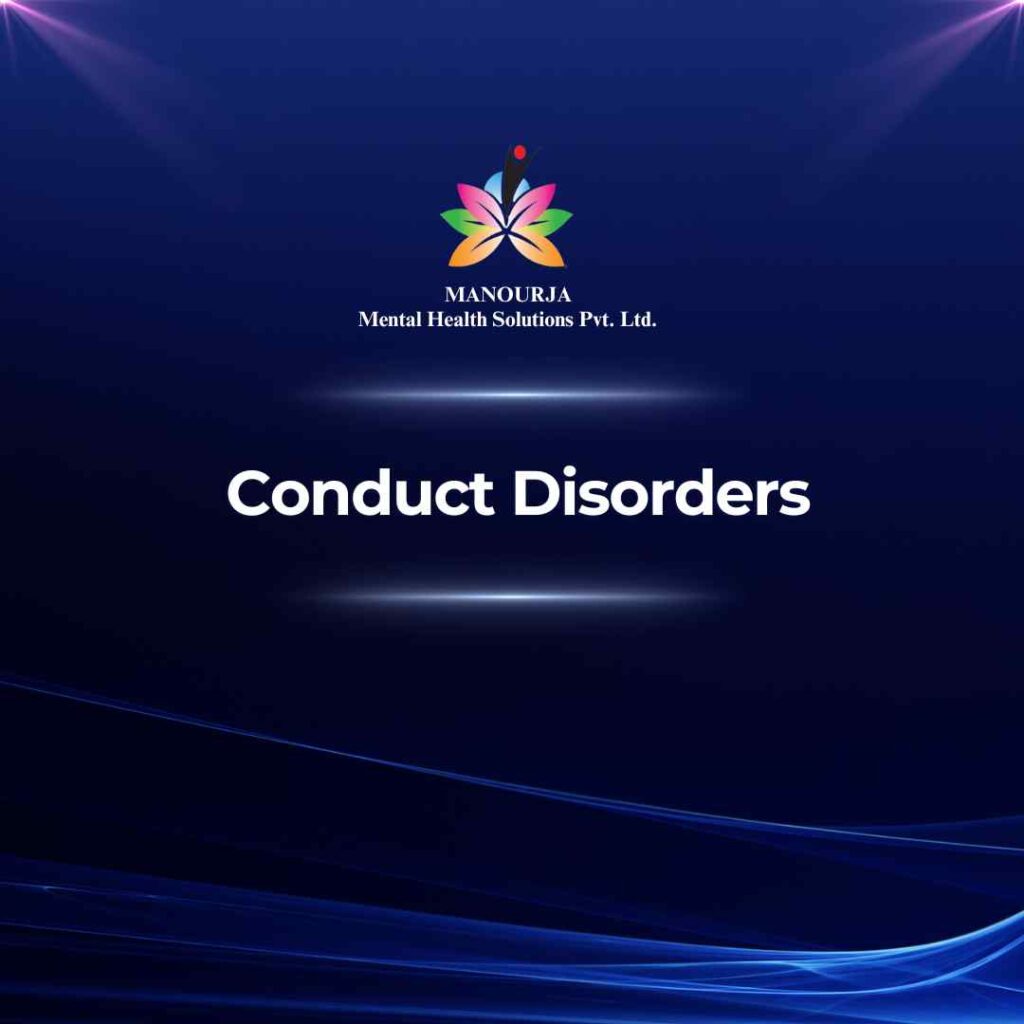Conduct Disorders

Conduct disorders represent a group of behavioral and emotional problems in children and adolescents characterized by a persistent pattern of rule-breaking, social norms defiance, and violating the rights of others. Individuals with conduct disorder exhibit behaviors that are socially unacceptable and aggressive, often causing significant problems in school, social settings, and at home.
Symptoms of Conduct Disorders include
- Aggressive Behavior: This includes physical violence towards people or animals, bullying, and initiating physical fights.
- Destructive Behavior: Engaging in activities that deliberately destroy property, such as vandalism or arson.
- Deceitful Behavior: Frequent lying, using aliases, or deceiving others for personal gain or pleasure.
- Violation of Rules: Includes severe violations of societal norms and rules, such as truancy, running away from home, and breaking curfews. These behaviors are more severe and frequent than typical childhood mischief or adolescent rebelliousness.
Differences Between General Disorders and Conduct Disorders
Nature of Symptoms:
- General Disorders: This term covers a wide range of mental health conditions each characterized by different sets of symptoms—such as sadness in depression, excessive fears in anxiety disorders, or distorted thinking in schizophrenia.
- Conduct Disorders: Specifically characterized by behavioral problems that include aggression towards people or animals, destruction of property, deceitfulness or theft, and serious violation of rules.
Impact on Social Interactions:
- General Disorders: The impact can vary significantly. For instance, depression might lead to withdrawal, anxiety might increase dependency, and personality disorders might cause unstable relationships.
- Conduct Disorders: Almost always have a negative impact on social interactions due to aggressive or antisocial behavior. These individuals often find themselves in conflict with societal norms and authority figures.
Age of Onset:
- General Disorders: Can begin at any age depending on the disorder. For example, anxiety disorders can start in early childhood, depression in late adolescence, and dementia in old age.
- Conduct Disorders: Typically become evident during late childhood or adolescence. Before the age of 10, it’s often diagnosed as childhood-onset type, and if symptoms appear during adolescence, it’s termed as adolescent-onset type.
Treatment Approaches:
- General Disorders: Treatment varies widely depending on the specific disorder and may include medication, psychotherapy, lifestyle changes, and support groups.
- Conduct Disorders: Treatment typically involves a combination of behavioral therapies, family interventions, school-based programs, and sometimes medication (mainly used to treat co-occurring conditions such as ADHD or depression).
Treatment of Conduct Disorders
Effective management of conduct disorder is challenging and often requires a comprehensive approach:
- Behavioral Therapy: Focuses on correcting harmful behaviors through behavior modification techniques and cognitive-behavioral strategies.
- Parental Training Programs: Educate parents on effective parenting techniques and ways to manage disruptive behaviors.
- Family Therapy: Helps improve communication and resolve conflicts within the family that may contribute to the behavior problems.
- School-Based Programs: Interventions to improve behavior and support educational success are critical, as many individuals with conduct disorder struggle academically.
- Medication: While there are no specific drugs approved for conduct disorder itself, medications may be prescribed for co-occurring symptoms like impulsivity, aggression, or a co-occurring mood disorder.
Conduct disorder is a serious psychiatric condition that requires early intervention to improve long-term outcomes. Without appropriate treatment, individuals with conduct disorder are at increased risk for substance abuse, legal issues, and ongoing mental health problems, including antisocial personality disorder in adulthood.
At MANOURJA, we believe in the transformative power of counseling. Our experienced therapists offer a safe and supportive space where you can explore your thoughts, emotions, and challenges. Through personalized counselling sessions, we’ll work together to develop coping strategies, build resilience, and achieve lasting positive change. Discover the path to a healthier, happier you with MANOURJA counselling services.
MANOURJA Rehabilitation Services
At MANOURJA, we’re dedicated to helping you in rebuild your life, after difficult times. Our rehabilitation services focus on understanding what you need to move forward, whether you’re recovering from addiction, trauma, or any psychological – social challenges. We create personalized plans, that are all about helping you, regain your strength and find hope again. With a caring team by your side, you’ll have the support to make real progress and take steps toward a brighter, healthier future.
